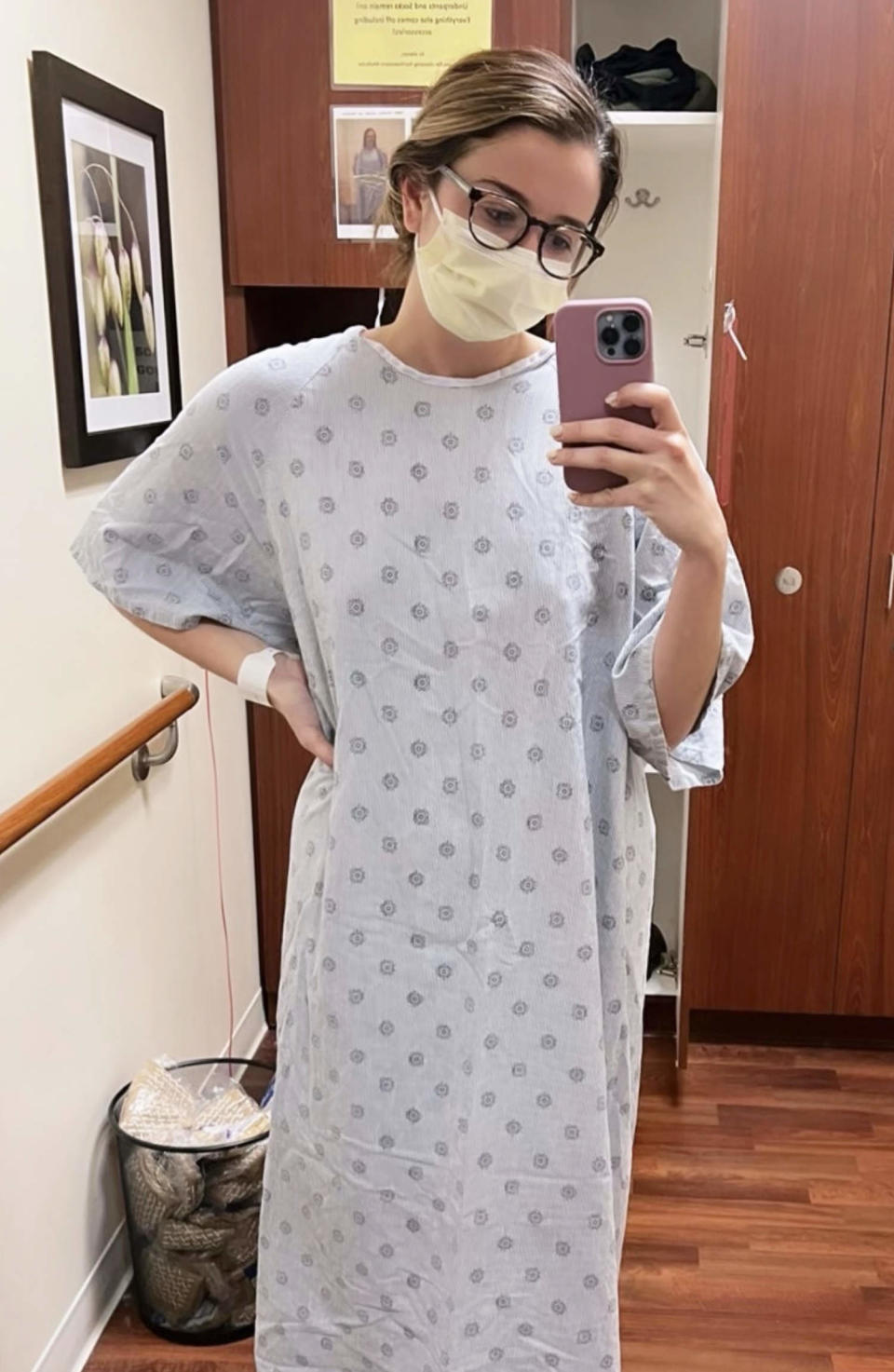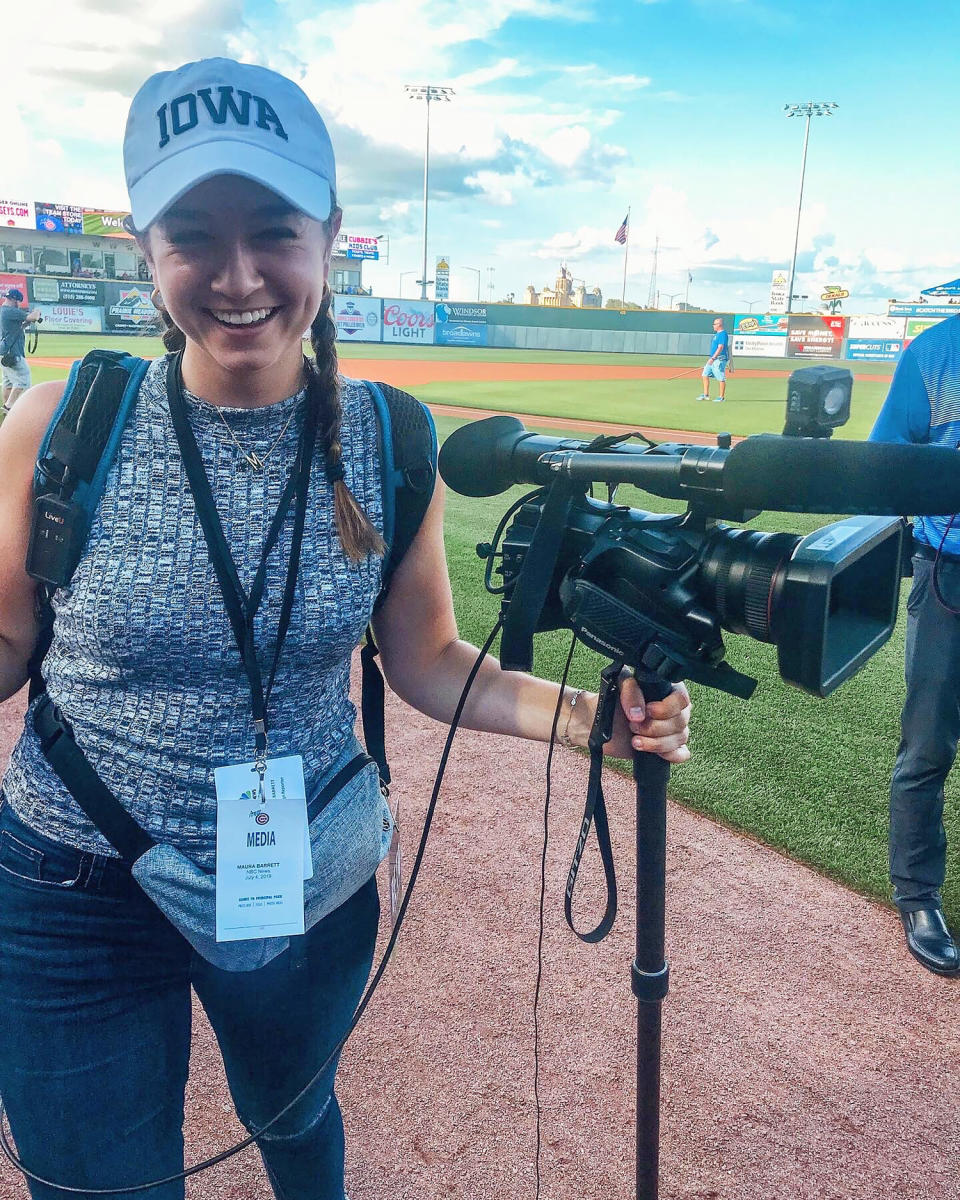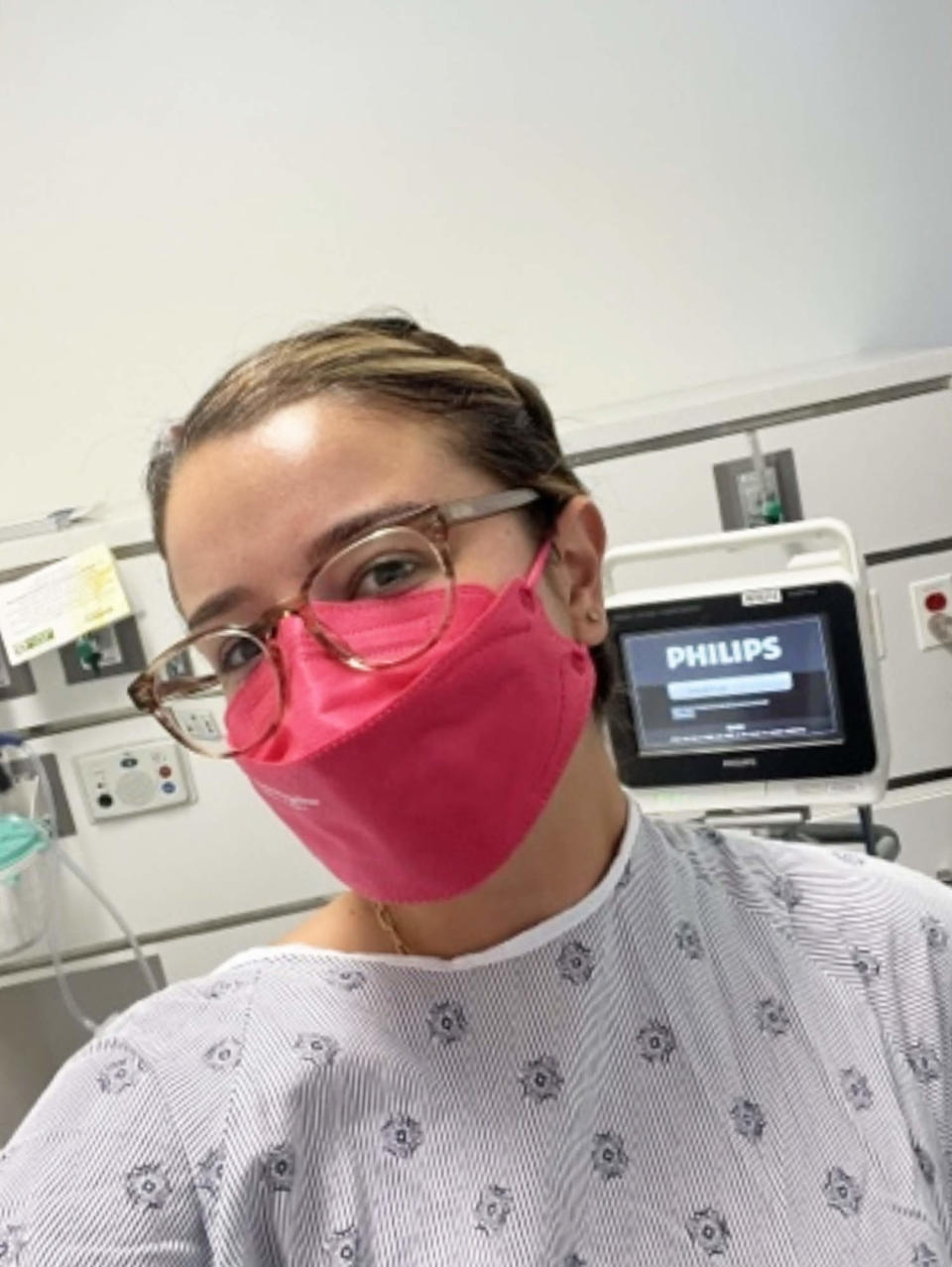NBC's Maura Barrett reveals Lyme disease battle, says doctors dismissed her for months
- Oops!Something went wrong.Please try again later.
“You breed chronic ailments.”
My best friend texted me, responding to a photo I’d sent her from the doctor’s office as I waited to get a blood test (“Hospital gown chic!” I wrote). It wasn’t the first time I’d texted her while waiting for medical results, but given it was mid-March 2020 — early days in the COVID-19 pandemic — her concern had escalated, and despite my attempt at a humorous selfie, I was scared. I had no idea Lyme disease had been infiltrating my body for way longer than any doctor would recommend going without treatment.

I knew something was wrong a few months earlier. At the time, snow was falling, signaling the start of winter in Iowa, which meant my work as a campaign-embedded reporter ahead of the 2020 election was about to get even busier.
One day, I noticed a sharp pain in my left knee as I pulled my foot out of my winter boots. Working on the trail often meant I’d write my stories cross-legged on the floor or perched on my camera case at crowded campaign events. I initially shrugged it off, thinking I could be sore from sitting in those awkward positions. But each day, the twinge of pain got a little worse, and soon, my right knee followed suit. And it was more frequent, sometimes tweaking while I walked.
But it was crunch time in the Iowa caucus season, so my days were getting longer and even busier, and I didn’t think a doctor appointment wasn’t an option.
January 2020 was a blur — made blurrier by the first week of February, when the caucus election system failed, keeping me in Iowa reporting at all hours of the day for 10 days longer than planned. My next stop was a seat on presidential candidate Mike Bloomberg’s plane leading up to presidential primary election day, aka Super Tuesday. We flew between multiple cities a day and spent each night in a different state. I was exhausted, living out of a suitcase and hoisting my camera gear into the overhead compartment on his plane several times a day. That’s when I noticed the joint pain was replicated in my elbows. The best way to describe the twinges of pain is as if I’d fallen while twisting my joint and simultaneously throwing all my weight on top of it.
Luckily, Bloomberg wanted a day off the campaign trail for his birthday in February, so we finally had a down day in New York, and I was able to get an appointment with an orthopedic specialist.

“How active are you? What do you do for work?” he asked me. I explained the jack-of-all trades requirements of a campaign embed: constant travel, producing political content for all of NBC News’ platforms, writing online articles on the go, reporting live on-air when news broke, all while lugging around 60-plus pounds of camera gear.
He blinked. “So you blog?” I tried not to roll my eyes as he prodded at my knees and elbows, finishing quickly and declaring, “You might just be lifting too quickly. Tone it down and see if it gets better. I don’t see any signs of a major issue.”
My jaw dropped. I’d learned how to train in a gym playing competitive sports in high school and had since run half a dozen half-marathons. This wasn’t a matter of lifting incorrectly. Something else was wrong, and my gut knew it. But I didn’t say anything; I couldn’t.
I respect and trust doctors, but he’d minimized my monthslong experience of what I knew was abnormal pain. I felt demeaned, frustrated and embarrassed. But this doctor was in a position of authority, with expertise that I didn’t have, in one of the best hospital systems in the country, so who was I to question him? But after I left, still in pain, and thought about it, I became angry with myself: I challenged presidential candidates on the trail nearly every day, but I couldn’t stand up to a doctor about my own symptoms, my own body?
The next day, I was back on the campaign trail with Bloomberg. I was hopeful for a bit of a break after Super Tuesday so I could get a second medical opinion about my joint pain. But it turned out to be more than a brief break. Bloomberg dropped out of the race shortly after he failed to win any of the primary states. Then, the pandemic shut the world down.

Having given up my apartment the year before to be on the road full time, I went home to my parents’ in Pennsylvania and caught up on weeks of lost sleep. A few nights of 12-plus hours of sleep per night turned into a few weeks, and I started to get concerned again. I woke up more exhausted than I was when I’d gone to bed. I was constantly sluggish, and any movement more than basic walking hurt my joints.
I thought back to the doctor in New York. Making excuses for him, I acknowledged that I was only 25 at the time. Nothing’s supposed to be that wrong with you at 25. But if I was medically fine, maybe I just wasn’t cut out for a job like this? Was I being overly dramatic? Maybe everyone else on the trail was experiencing the same issues but just powered through. I questioned whether I had the stamina to continue pursuing my dream as a journalist.
My mom was the one who ultimately figured it out: Lyme disease. She’d had it twice and was wary of the combination of exhaustion and joint pain. I was hesitant, given my lack of exposure to ticks on the campaign trail, but my symptoms were becoming too apparent to ignore.
And yet, she was right. My family’s doctor called me after a blood test confirmed it, explaining that my levels clearly depicted Lyme disease and it had been present for “a pretty long time, likely even from last summer,” I remember him saying.
It was then that I had a flashback from nine months earlier: a campaign stop with Beto O’Rourke on a farm in Lacona, Iowa. Another reporter had found a tick buried in his skin afterward, but my colleague checked me and didn’t find anything. That was the only exposure I could’ve possibly had.
I was extremely lucky that my symptoms weren’t worse. My doctor explained patients left untreated on the same timeline could suffer from facial paralysis, arthritis or even issues with the brain and spinal cord. I was treated with a lengthy dose of antibiotics and almost immediately started feeling better.
I thought back to the doctor in New York. I felt vindicated, but the interaction seemed even more demeaning. My mother is a brilliant woman, but she’s not a doctor. And even though I didn’t have the classic rash some Lyme patients do, I had two of the other key symptoms. If my mom suggested the blood test, shouldn’t he have done the same rather than dismiss me?
I later learned my experience had a name: medical gaslighting. I’d experienced it before, with a misdiagnosis of a broken and dislocated tailbone. The orthopedist told me it was just a hairline fracture that would resolve by itself. Even now, I’m recovering from hip surgery because I tore my cartilage in several places and the ball of my hip was pressing against the cup, causing further issues. Doctors initially just called it “hip pain.”

Research highlights that errors in diagnoses can occur in up to one out of every seven encounters between a doctor and patient, and women are more likely to be misdiagnosed than men.
As much as I like to be the tough, hard-headed journalist, in my personal experience, it’s felt like society’s expectations for women translate to being seen as a “good patient” in the doctor’s office. Explain the new symptoms concisely and use medical jargon, but not too much that it looks like you memorized WebMD. Nod obediently at the doctor’s suggestions. Don’t push back.
As women, we’ve pushed back against society’s “rules” whether it be at the office, or at home — and my hope is more women start bringing that mindset to their doctors’ offices. I’ve found that I’m best prepared when I’m armed with information and cite sources so I can ask the hard questions. As a journalist, I know that knowledge is power. I also have felt more comfortable pushing back when I bring a loved one with me to the consultation.
After my experience with Lyme disease, I know more than ever that I deserve answers and to be taken seriously by doctors, not to leave their office feeling frustrated and dismissed.
This article was originally published on TODAY.com

